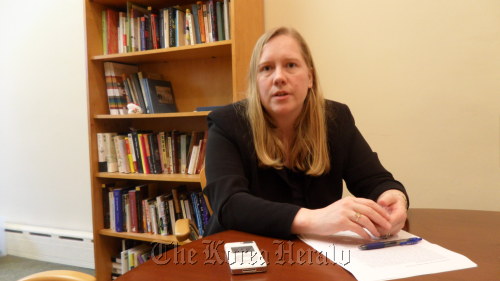Acting chair stresses use of hallyu to draw U.S. students
BOSTON ― Boston University’s College of Arts & Sciences will appoint a scholar in Korean and comparative literature to enhance Korean studies, and strengthening the existing four-year Korean-language, cinema and media program, said a professor at BU.
“Boston is a strong place for Korean studies. One reason that Korean studies has become popular is that, over the several decades, Chinese and Japanese studies have developed quite a lot, it has become very clear how important Korean studies are,” Sarah Frederick, acting chair of the modern languages and comparative literature department of Boston University, said in an interview with The Korea Herald.
The university’s new professorship program after the Korea Foundation, which funds overseas professorships in the Korean language and literature, recently gave a grant to BU. Frederick is in charge of searching for the new professor to begin teaching in the fall of 2011.
The position will be a tenure-track assistant professorship in the department of modern languages and comparative literature.
For the first three years, the Korea Foundation will pay most of the professor’s salary through the university. Thereafter, the university will take over, Frederick said.
BOSTON ― Boston University’s College of Arts & Sciences will appoint a scholar in Korean and comparative literature to enhance Korean studies, and strengthening the existing four-year Korean-language, cinema and media program, said a professor at BU.
“Boston is a strong place for Korean studies. One reason that Korean studies has become popular is that, over the several decades, Chinese and Japanese studies have developed quite a lot, it has become very clear how important Korean studies are,” Sarah Frederick, acting chair of the modern languages and comparative literature department of Boston University, said in an interview with The Korea Herald.
The university’s new professorship program after the Korea Foundation, which funds overseas professorships in the Korean language and literature, recently gave a grant to BU. Frederick is in charge of searching for the new professor to begin teaching in the fall of 2011.
The position will be a tenure-track assistant professorship in the department of modern languages and comparative literature.
For the first three years, the Korea Foundation will pay most of the professor’s salary through the university. Thereafter, the university will take over, Frederick said.

“Having a Korean specialist is something I pursued even before I became chair of the modern languages and literature,” she said, adding that the most important qualification would be a broad expertise in Korean studies to teach Korean history spanning from early centuries to the present. The literature professor should be fluent both in Korean and English.
With the new professorship, BU will offer students a minor in Korean language and literature, Frederick said.
The university’s increased focus on Korean studies came in line with a dramatic increase in enrollments in BU’s Korean language courses.
According to Frederick, enrollments rose 40 percent from 2006-2007 to 2007-2008. In 2009-2010, the number of students in Korean language courses grew 17 percent to 138, far exceeding the growth in all other language programs at BU, she said.
There are now about 3,797 international students out of the total of 29,000 BU students, with 457 from South Korea.
As with other Korean-language programs in the U.S., a large number of students doing Korean studies have Korean heritage. However, in recent years, a majority of students studying Korean have not had any prior knowledge of Korean.
Although there is more coverage of East Asian studies in U.S. world history text books than before, the main focus is still on Europe and America, she said.
To continue nurturing interests in Korean history and language, Frederick said it is important to use the increased interest in Korean pop culture as a way of hooking Americans to study more, or more in-depth, about Korea.
“I’ve seen young scholars of literature and cinema making a creative effort to use the Korean Wave as a way of hooking people to other texts. For example, using pre-modern Korean dramas and Korean songs to help learn the language,” she said.
“We have a class on Korean cinema, using it as a way of introducing Korean culture and history.”
The other important factor in increasing interests in Korean studies is high-quality literary translation so that non-Koreans can read Korean literature. Frederick pointed to Shin Kyung-sook’s book “Please Look After Mom” as an example of good translation.
In terms of international politics and economics, many young Americans are interested in seeking a career in Asia and the robust growth of the Korean economy has partly helped students seek more Korean programs in the U.S. in recent years, Frederick said.
By Kim Yoon-mi, Korea Herald correspondent
(yoonmi@heraldcorp.com)











![[Today’s K-pop] BTS pop-up event to come to Seoul](http://res.heraldm.com/phpwas/restmb_idxmake.php?idx=644&simg=/content/image/2024/04/17/20240417050734_0.jpg&u=)




![[KH Explains] Hyundai's full hybrid edge to pay off amid slow transition to pure EVs](http://res.heraldm.com/phpwas/restmb_idxmake.php?idx=652&simg=/content/image/2024/04/18/20240418050645_0.jpg&u=20240419100350)

![[Today’s K-pop] Zico drops snippet of collaboration with Jennie](http://res.heraldm.com/phpwas/restmb_idxmake.php?idx=642&simg=/content/image/2024/04/18/20240418050702_0.jpg&u=)